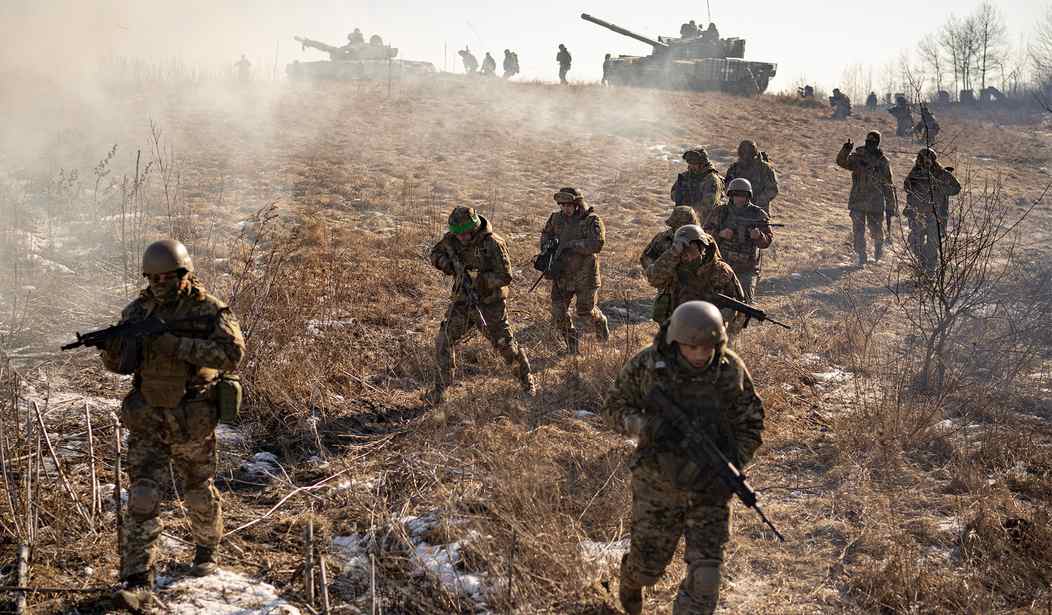It appears that Joe Biden is finally acknowledging reality and will now seek a negotiated end to the Ukraine war.
Whether Ukraine's President Volodymyr Zelenskyy is on board with the new strategy is irrelevant. Biden and Kyiv's European allies see the writing on the wall. Both see their aid packages for Ukraine in serious trouble. And both acknowledge that the military goal of defeating Russia and kicking it out of Ukraine's territory entirely is beyond reach.
With that acknowledgment comes the recognition that Ukraine's "counteroffensive" didn't achieve much of anything except adding tens of thousands of names to the butcher's bill. Last August, the New York Times reported that Ukraine's armed forces had suffered half a million casualties. It's certainly much higher now.
About 20% of Ukraine is still under Russian control, and given the circumstances, Russia is not going to be in the mood to give any of that territory back and may demand more territorial concessions from Kyiv.
The U.S. wants Zelenskyy to redeploy his forces away from the failed counteroffensive "into a stronger defensive position against Russian forces in the east, according to the administration official and the European diplomat, and confirmed by a senior administration official," says Politico.
The goal is to "shore up" Ukraine's negotiating position by strengthening its military position.
“That’s been our theory of the case throughout — the only way this war ends ultimately is through negotiation,” said the official, a White House spokesperson who was given anonymity because they are not authorized to speak on the record. “We want Ukraine to have the strongest hand possible when that comes.”
I recall the White House criticizing anyone who suggested negotiations. What's changed?
The White House and Ukraine's European allies have decided that offensives against Russia's prepared positions are useless. It's time for Kyiv to create its own impenetrable wall and force Putin to see the futility of continuing the war.
“Those discussions [about peace talks] are starting, but [the administration] can’t back down publicly because of the political risk” to Biden, said a congressional official who is familiar with the administration’s thinking and who was granted anonymity to speak freely.
If Ukraine starts pulling back and consolidating its forces, the cat will be out of the bag and Biden won't be able to deny that an effort to end the war diplomatically is underway.
Over the past year — with U.S. military support flagging fast on Capitol Hill and Zelenskyy’s once-vaunted counteroffensive failing since it was launched in June — Biden has shifted from promising the U.S. would back Ukraine for “as long as it takes,” to saying the U.S. will provide support “as long as we can” and contending that Ukraine has won “an enormous victory already. Putin has failed.”
Some analysts believe that is code for: Get ready to declare a partial victory and find a way to at least a truce or ceasefire with Moscow, one that would leave Ukraine partially divided.
“Biden’s victory comment has the virtue of being true,” said George Beebe, a former chief of Russia analysis for the CIA who is now head of strategy for the Quincy Institute for Responsible Statecraft. But “time has become a stark disadvantage when it comes to Ukraine’s manpower and industrial capacity, and that’s true even if the West continues its support. The longer this goes on the more we’re going to have to concede up front just to get the Russians to the negotiating table.”
The strategy is a familiar one for a smaller nation fighting a larger nation. The goal is to hunker down and force the larger nation to exhaust itself trying to breach the defenses of the smaller nation. But Ukraine is going to need billions of dollars in weapons that may not be available from the U.S.
And hanging over the fighting is the prospect of Ukraine joining NATO. To forestall that possibility, Putin may be willing to grant Ukraine concessions. But Ukraine in NATO could put the world on a hair trigger for nuclear war. Putin could use that threat to demand concessions elsewhere in Eastern Europe.
It's a shame that Biden couldn't have made this move earlier this year. Ukraine was in a much stronger position then. Now Biden has to contend with a resurgent Russia and a reluctant ally who may not be willing to give up without winning more territory back from Russia.










